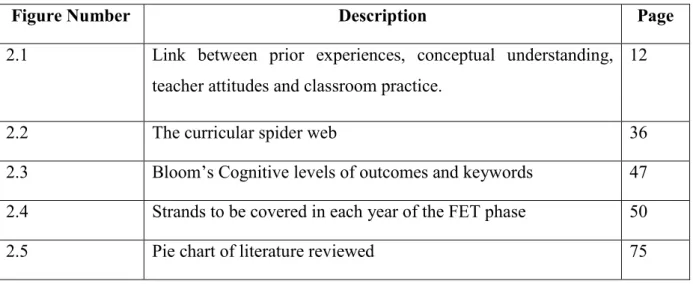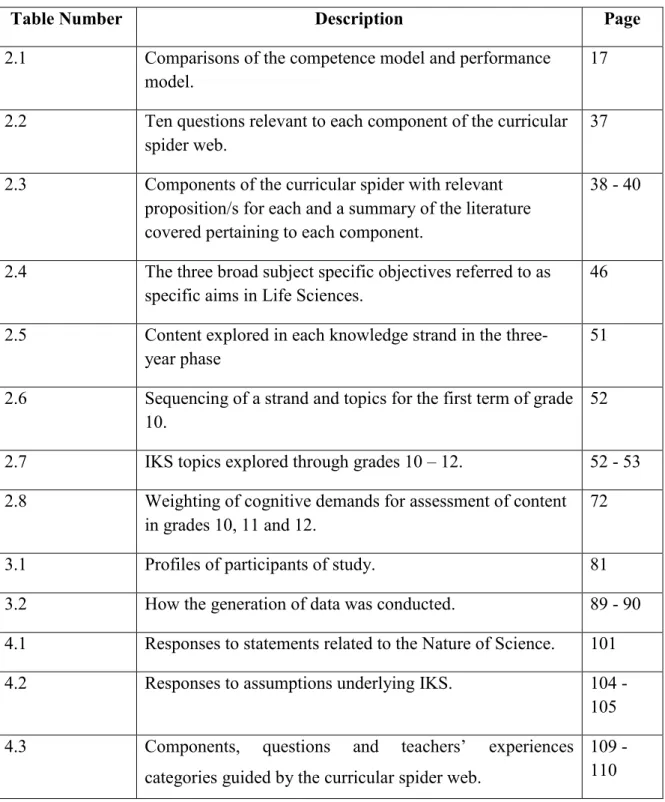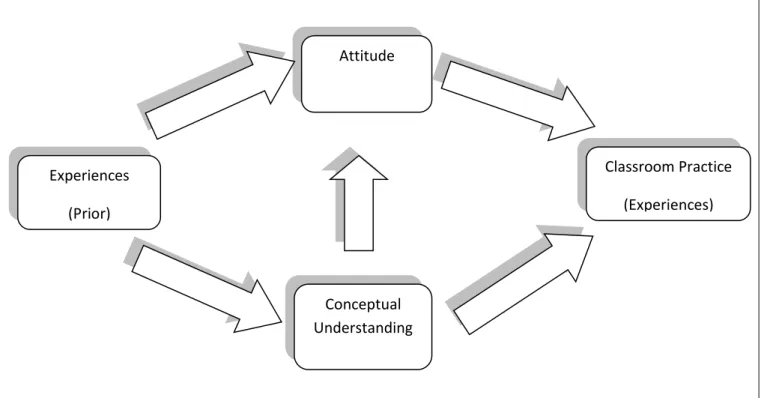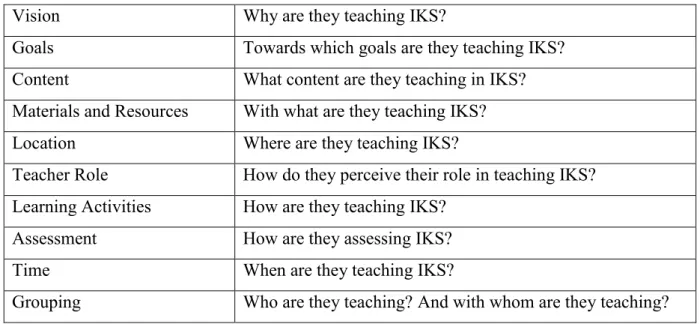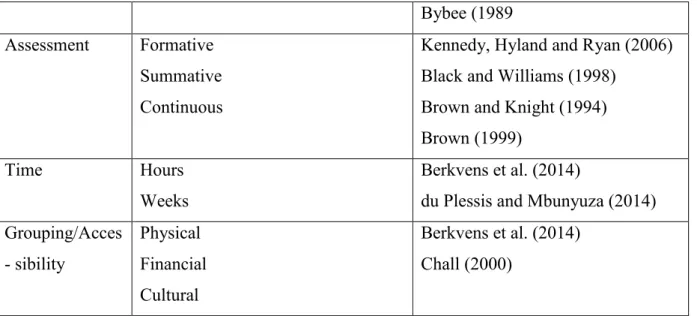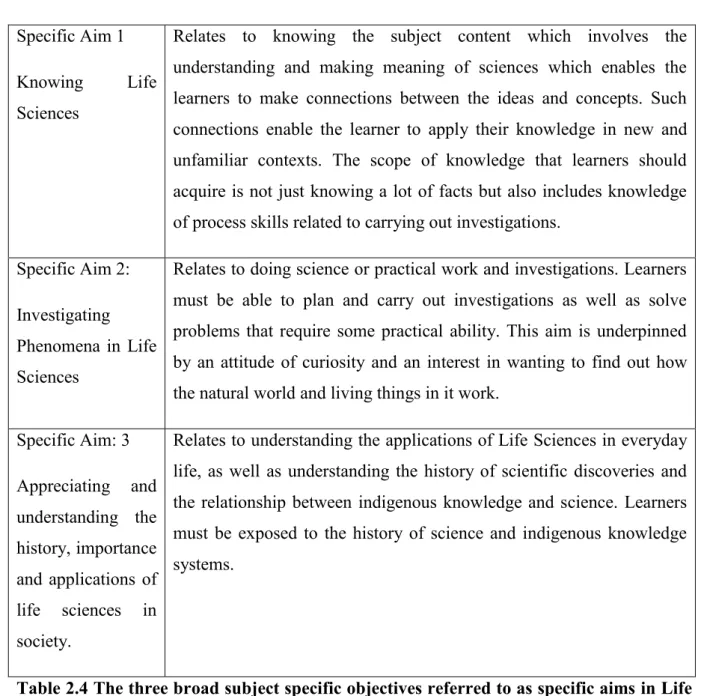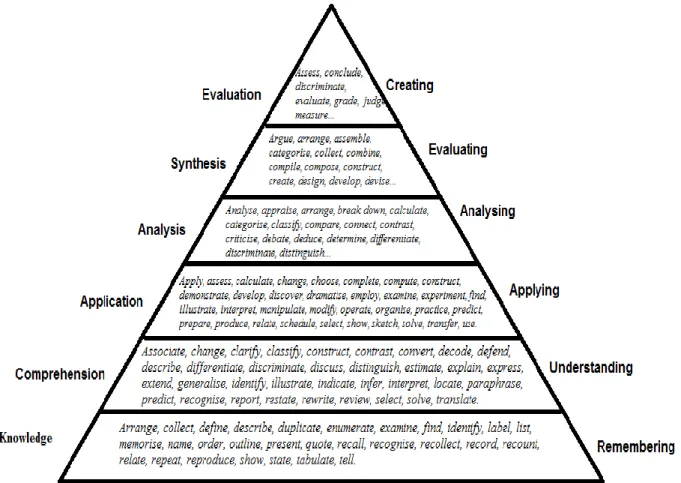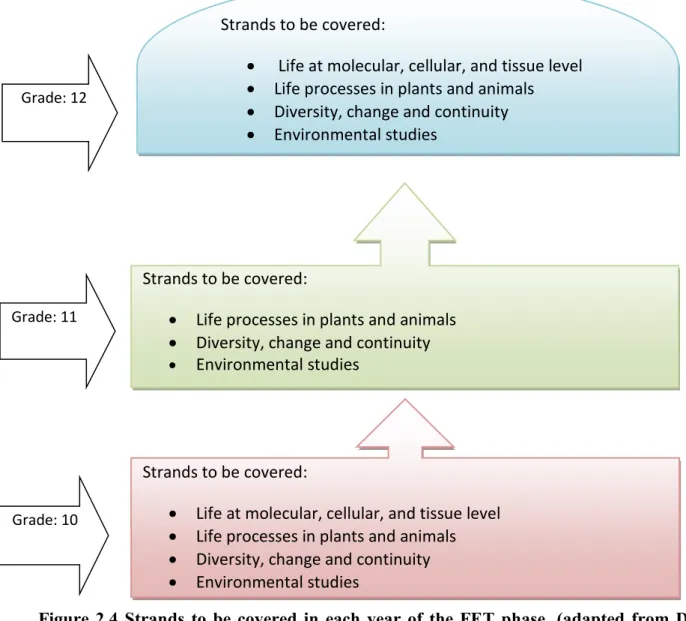If the work of others has been used, this is duly acknowledged in the text. In exploring teachers' experiences, the study identifies teachers' attitudes towards IKS and the impact of these experiences, which includes their attitudes, on their classroom practice.
LIST OF TABLES
LIST OF APPENDICES
CHAPTER ONE
BACKGROUND AND ORIENTATION TO THE STUDY
- Introduction
- Curriculum reform and Indigenous Knowledge Systems in South Africa
- Purpose of the study
- Objectives of the study
- Research questions
- Significance of study
- Chapter 1 Background and Orientation to the Study
- Chapter 2 Literature Review and Conceptual Framework
- Chapter 3 Research Methodology
- Chapter 4 Research Findings and Discussion
- Chapter 5 Conclusion and Recommendations
- Chapter Summary
This chapter presents a discussion of the findings and the conclusions drawn from the findings that are relevant to the objectives of this study. This chapter describes the historical background of the South African education reforms that led to the inclusion of IKS in the new curriculum policy.
CHAPTER TWO
LITERATURE REVIEW AND CONCEPTUAL FRAMEWORK
Introduction
- Linking teacher experiences to attitudes and classroom practice
The comprehensiveness of the study can be attributed to the different data collection methods used. Through their evaluation, they can also be used as a tool to improve the teacher's practice in the classroom.
Study filling gaps in the existing literature on IKS
The criteria mentioned as a basis for the study above are relevant to this study, in light of this study which aims to research teacher practice. This study can therefore initiate or contribute to a discussion related to teachers and IKS, which can influence areas of teacher education in the Life Sciences.
What is curriculum?
The representation of the implemented curriculum is about the curriculum that works and is informed by teachers' interpretations of the intended curriculum as stated above. Finally, the implemented curriculum is measured in terms of the achieved curriculum which is related to the (nano) results achieved by the student.
Types of Curriculum
The role of the teacher in the implementation of the curriculum is certainly overt when there is a lot of control by the teacher in terms of the selection, sequence and pace of learning. It is therefore the teacher's job to direct teaching (selection, sequence and pace) in terms of syllabus coverage.
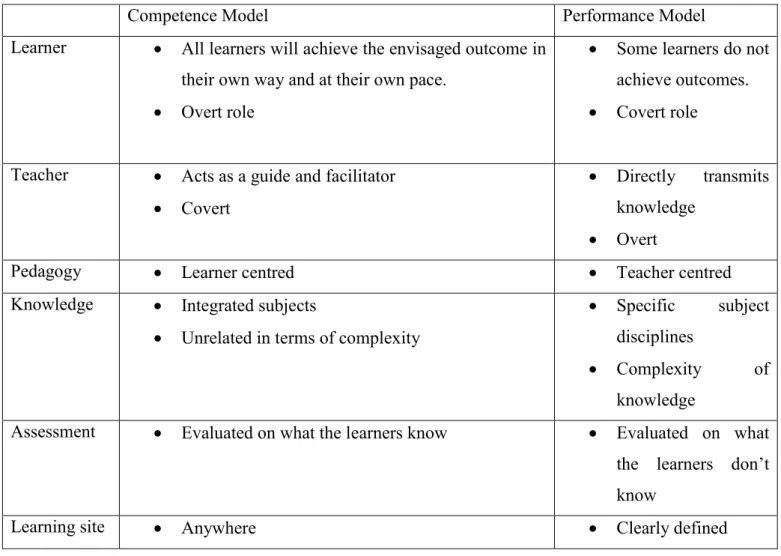
Ideological nature of a curriculum
- Other issues which contribute to the complexity of defining IKS
Durie (2004) believes that one of the consequences of indigenous colonization is the marginalization of IKS as a form of knowledge. However, there is no clear distinction between actual and practical knowledge among traditional healers.
Western/Scientific Knowledge and Indigenous/Traditional Knowledge
He states that a dominant theme is to categorize Western/scientific knowledge and indigenous/traditional knowledge by identifying the differences between them. Understanding this point leads to the view that Western/scientific knowledge and indigenous/traditional knowledge can share a relationship that is complementary in nature.
The Nature of Science
When defining NOS, one must be aware of the multifaceted nature of the concept. The first aspect of the consensus views on the nature of science that he comments on concerns the provisional nature of scientific knowledge.
Conceptual Framework
- Vision
- Goals
- Life Sciences Content
- Materials and Resources for teaching IKS
- Life Sciences teachers’ role in relation to IKS and the curriculum
- Assessment
- Time
In the case of the social vision, the needs of society are at the core of the educational process. This social vision, which places the needs of society at the center of teaching and learning, is identified in the literature in terms of the value attributed to IKS. Evidence for the differences between the different objectives can be found in the CAPS (DoE, 2011) for Life Sciences.
This non-exploration of IKS can be seen as a shortcoming of CAPS in terms of the content it covers. Researchers have commented in a previous section on the value of using IKS in teaching and learning science in terms of the learning theory used.
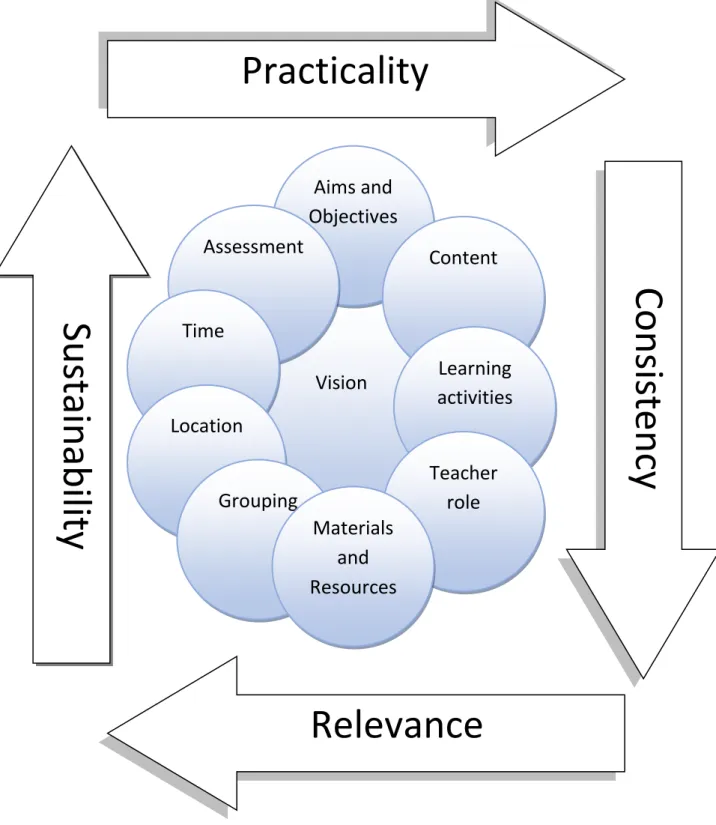
CHAPTER THREE
RESEARCH METHODOLOGY
Introduction
Therefore, the paradigm chosen for this study is the interpretive paradigm which, according to Christiansen et al. This point is in line with the reasons for using the interpretive paradigm for this study. Fourth, the use of a case study is associated with the strengths of its use.
Sampling
Life science teachers were purposively selected for this study as they are currently still working with the curriculum in terms of IKS and are therefore in the best position to engage with the aims of the study. The table below shows the academic qualifications of the participants selected for this study, which is also complimented with a description of each participant. Regarding the lack of reliability, this concept is not applicable to this study as it does not measure but rather aims to describe personal meaning and experiences.
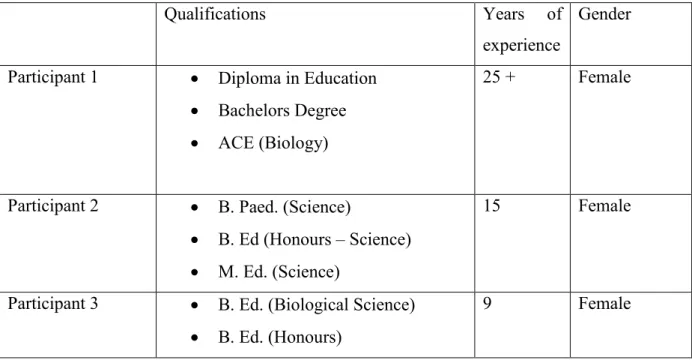
Data Generation Methods
- Questionnaire
Parts B and C of the questionnaire dealt with providing insight into the participants' understanding of NOS and IKS, respectively. The freedom of the participants was also encouraged by the environment in which the interviews took place. 90 Semi-structured interviews and lesson plans allowed the researcher to obtain a detailed and in-depth description of the participants' experiences with IKS.
Ethical Issues
The semi-structured interviews and lesson plans enabled the researcher to identify and understand the participants' experiences as they involved them and yield - in-depth description of their experiences which was used to understand them. Obtaining written consent from the participants involved to explain and describe to them the purpose, content, procedures, reporting and dissemination of the study, the right to voluntary non-participation, withdrawal and rejoining the study, the right of the participants to anonymity (pseudonyms are used ) and confidentiality, participants' right to ask questions about any aspect of the study and issue them with a letter of consent, which outlined the above, to sign. Participants were also informed about confidentiality issues, including ensuring that all paper copies of the data collected would be kept in a locked cabinet and that passwords would be used to lock all electronic copies of the data to prevent any other person from accessing the data for the next five years, after which all paper copies will be burned and all electronic copies will be deleted.
Trustworthiness
This ensured an understanding of the social environment and the establishment of a good relationship with the participants. This good rapport with the participants ensured trust, which was further enhanced by ensuring the anonymity of the participants. Consistency refers to the degree of neutrality to which the study's findings were generated by the participants rather than researcher bias.
Data Analysis
The fact that the questionnaire was designed to be self-administered also eliminated researcher bias. Sections B and C of the questionnaire explored participants' understanding of NOS and IKS respectively using statements relevant to these two concepts. The results were used in analyzing the participants' responses to the statements in order to ascertain their understanding of the two concepts explored in sections B and C.
Study Limitations
This question concerns whether the participant's overall score reflects a good/adequate or poor understanding of the concept being explored. The results obtained from the analysis process revealed that teachers who scored above 60% were adequate in terms of understanding NOS. Another limitation concerns one of the participants who was not satisfied with the recording of the interview.
CHAPTER FOUR
RESEARCH FINDINGS AND DISCUSSION
Introduction
Findings and Discussions .1 Analysis of questionnaires
- Analysis of semi – structured interviews and document analysis
- Component 1: Vision
- Component 2: Goals
- Component 4: Materials and Resources
- Component 8: Assessment
- Component 10: Grouping/Accessibility
The obtained percentages served to inform the level of understanding of NOS by the teachers. Direction on the other hand can be seen in terms of the teacher leading the discussions. An analysis of the joint test revealed that IKS was not evaluated in the test.
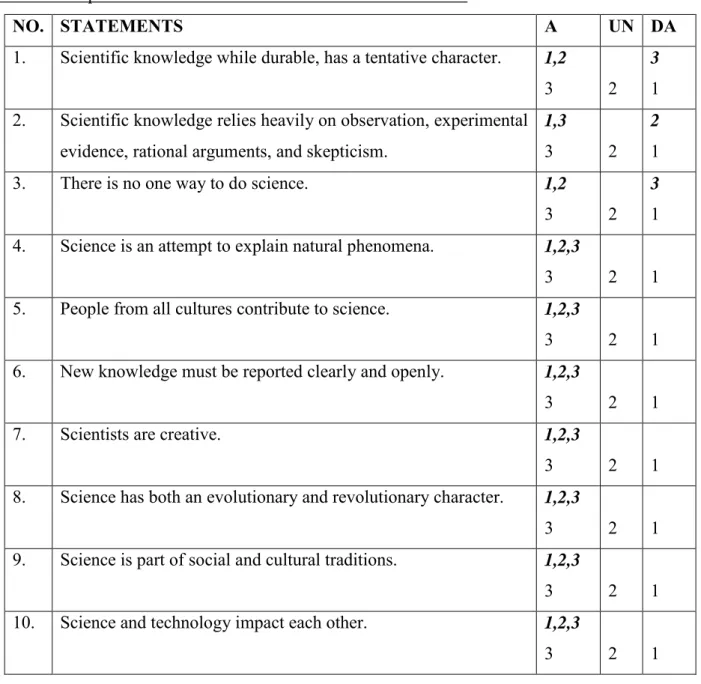
Chapter Summary
Those from lower socio-economic backgrounds are offered the same opportunities in terms of the learning environment created by the teachers and the opportunities offered to them in terms of extracurricular activities. Regarding the cultural issue that concerns whether the educational program is socially acceptable (Berkvens et al., 2014). The educational program offered by the school is indeed socially acceptable as the student population does not consist of a racial group which the school leaders and teachers deal with by including different cultures in the ethos of the school.
CHAPTER FIVE
CONCLUSIONS AND RECOMMENDATIONS
Introduction
Overview of study
- What are the teachers’ experiences of IKS?
- Vision for teaching IKS?
- Towards which goals are they teaching IKS?
- What content are they teaching?
- What materials and resources are they using?
- Where are they teaching?
- What is their role in teaching IKS?
- When were they teaching IKS?
- With whom are they teaching? /Who are they teaching?
- How do the teachers’ experiences of IKS influence their classroom practice?
This perceived lack of resources by the participants can be seen as justification for the underachievement of learners. The findings show that a combination of learner-centred and teacher-centred activities are used by the participants of the study. In the event that they are 'cultural brokers' in terms of the learning theory adopted, they have a facilitator role.
Suggestions for further research
This will result in an increase in the status of IKS in the classroom, as more time will be allocated to teaching and learning it. This disparity may be a result of their lack of understanding of the components found in the curriculum spider web. This is in relation to the limited time allocated to teaching and learning IKS.
Teachers' conception of indigenous knowledge curriculum in science in the context of Mberengwa District, Zimbabwe. Teachers' Interpretation and Implementation of Indigenous Knowledge Policy in the National Science Curriculum Statement, Unpublished PhD Dissertation, University of KwaZulu - Natal, Durban, South Africa. The challenge of preparing and equipping science teachers in higher education to integrate scientific and indigenous knowledge systems for students.
APPENDICES
The purpose of the study is to explore the teachers' experiences of indigenous knowledge systems found in the Life Sciences curriculum. My research project is titled: Teachers' Experiences of Indigenous Knowledge Systems (IKS) Found in the Life Sciences Curriculum: A Case Study of Life Sciences Teachers at a High School in the Pinetown District. The purpose of the study is to explore the teachers' experiences of indigenous knowledge systems found in the Life Sciences curriculum.
Please take note of the following issues
Therefore, it would be greatly appreciated if you could read this document, sign the statement below and return it to me. The study may also benefit curriculum developers in educational institutions by evaluating experiences of teachers in relation to indigenous knowledge systems found within the curriculum.
Please sign the following declaration and include your full names as indicated
The purpose of the study is to explore the teachers' experiences with Indigenous Knowledge Systems found in the Life Sciences Curriculum: A case study of Life Science teachers at a high school in Pinetown District. All responses to the teacher questionnaire are strictly confidential and are for research purposes only. If you experience any problems with the teacher questionnaire, please contact Marcell Mc Knight on 0794945231.
SECTION A: TEACHER BIOGRAPHICAL/GENERAL INFORMATION Indicate by placing a cross (X) in the appropriate option
SECTION B
SECTION C
